25+ Peer Feedback Examples to Download
There are many ways a person can improve their soft skills or hard skills through the collaborative efforts of one’s peers in the workplace. One can improve their practical and technical skills, which can increase the productivity of their output, product, service, and commodity. Therefore it is important to consider the usage of peer feedback in one’s workplace.
1. Peer Feedback in Language Training
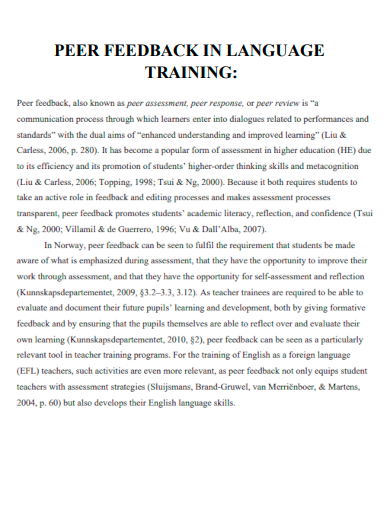
journal.uia
2. Peer Feedback in Online Environment
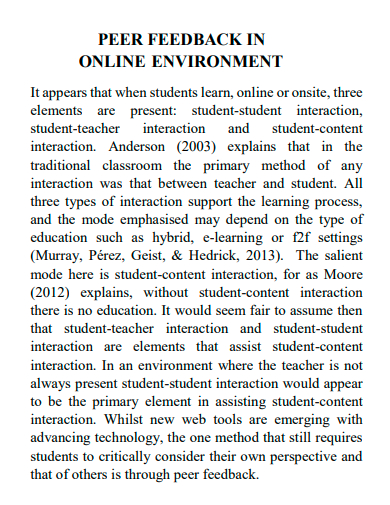
iiisci.org
3. Microblogging-Based Peer Feedback
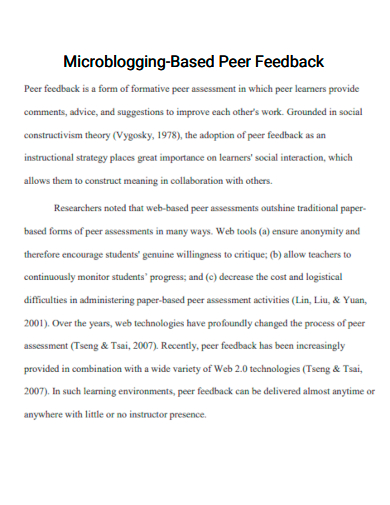
odu.edu
4. Peer Feedback in Developing Academic
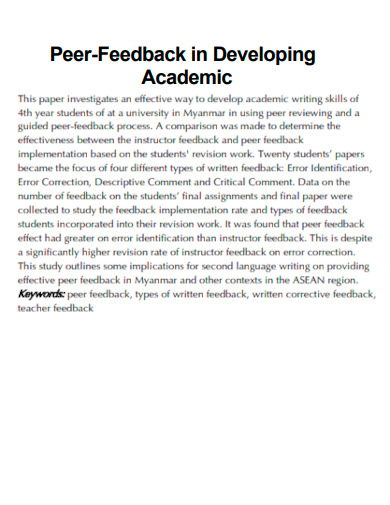
leia.org
5. Peer feedback in EFL Writing Teaching
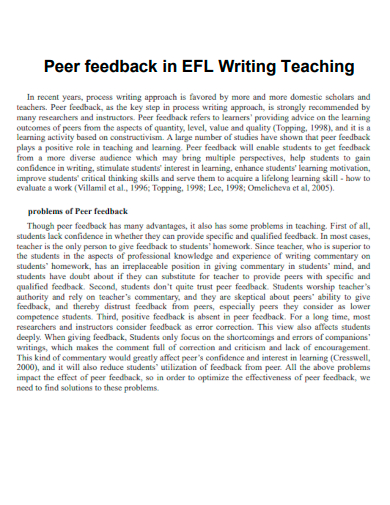
jalt.org
6. Feedback in Peer Assessment
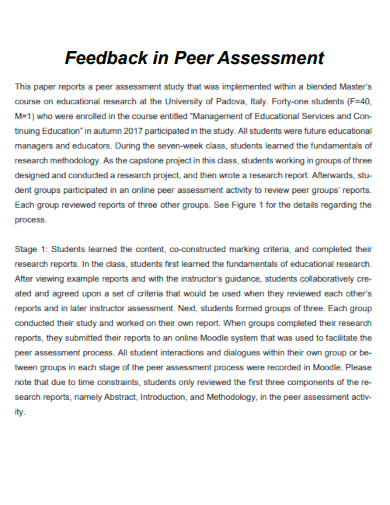
ojs.aishe.org
7. Effectiveness of Peer Feedback
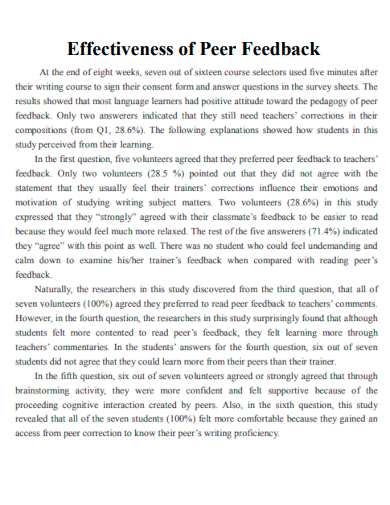
eric.ed.gov
8. Peer Feedback in the Classroom
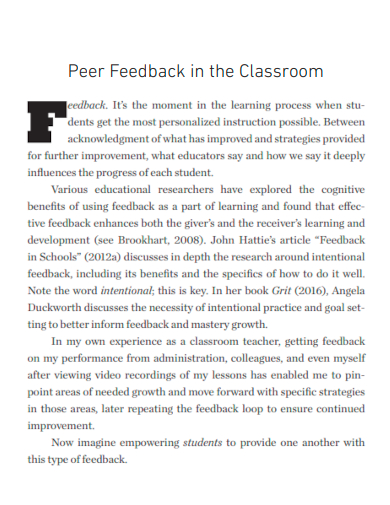
ascd.org
9. Providing and Receiving Peer Feedback
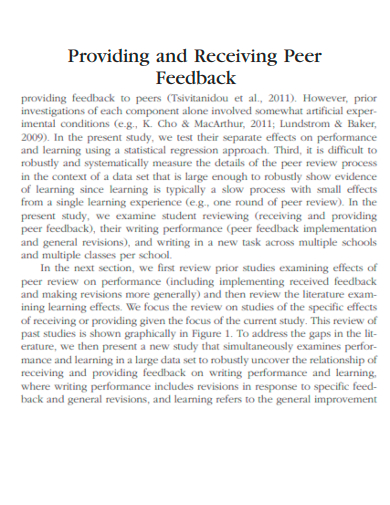
lrdc.pitt.edu
10. Peer Feedback Individual Accountability
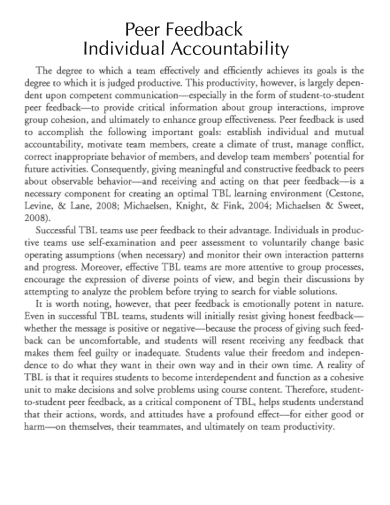
med.virginia.edu
11. Implementing Peer Review and Feedback
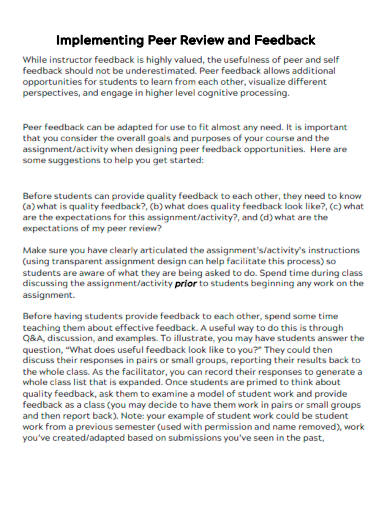
teaching.vt.edu
12. Composition Process of Peer Feedback
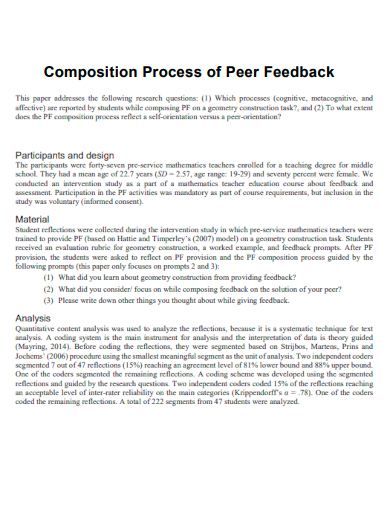
repository.isls.org
13. Dialogic Peer Feedback
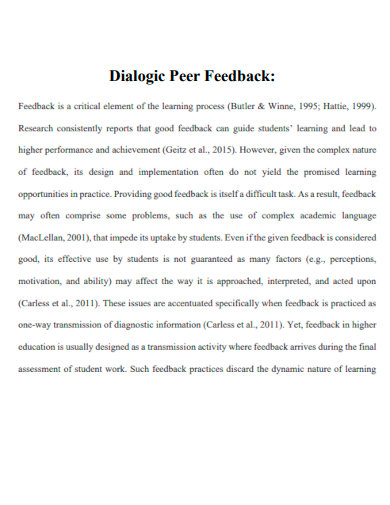
uvadoc.uva.es
14. Guide to Providing Peer Feedback
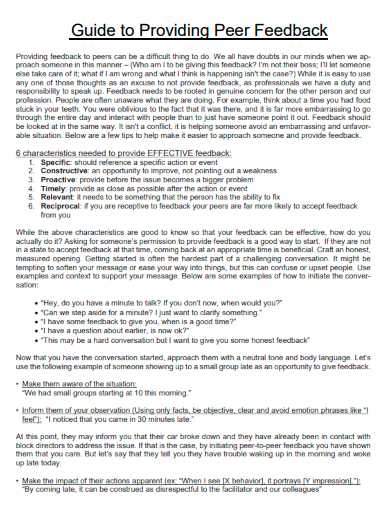
cuanschutz.edu
15. Peer Feedback Activity Description
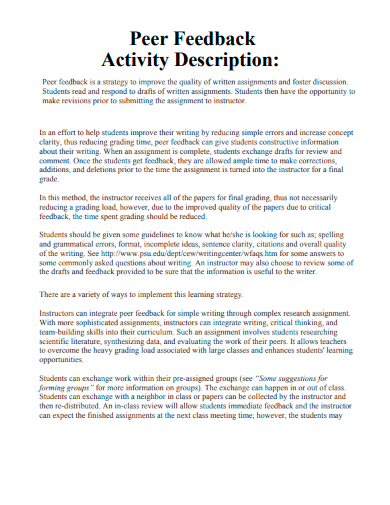
clayton.edu
16. Peer Feedback for Peer Learning and Sharing
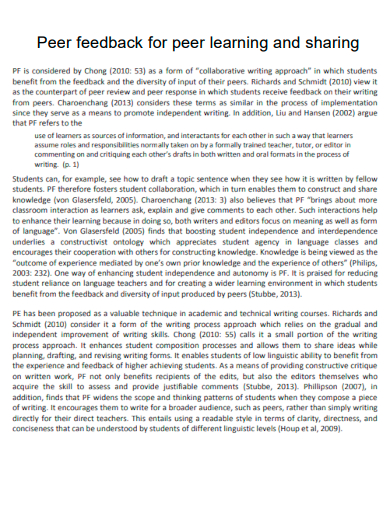
emerald.com
17. Peer Feedback Session
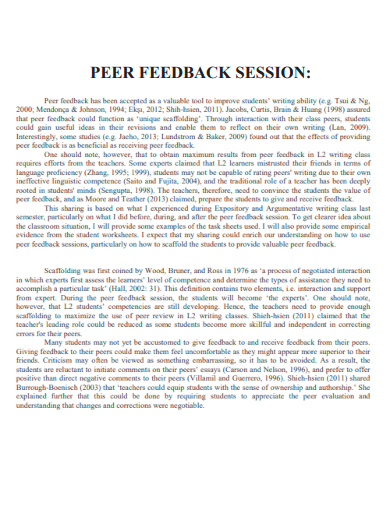
core.ac.uk
18. Exploring the Value of Peer Feedback
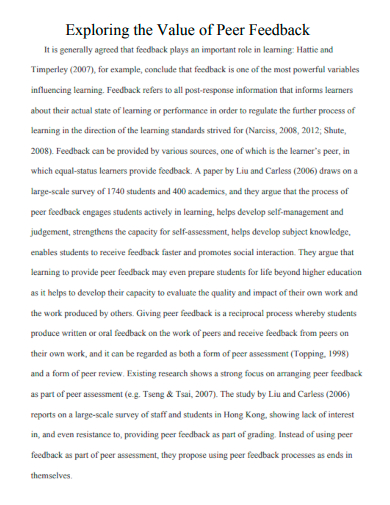
repository.han.nl
19. Peer Feedback Content
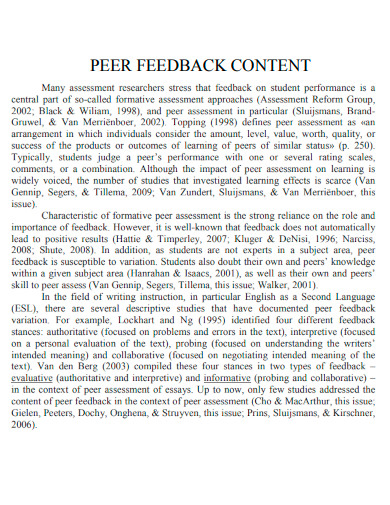
ub.uni-muenchen.de
20. Student Peer Feedback and Assessment
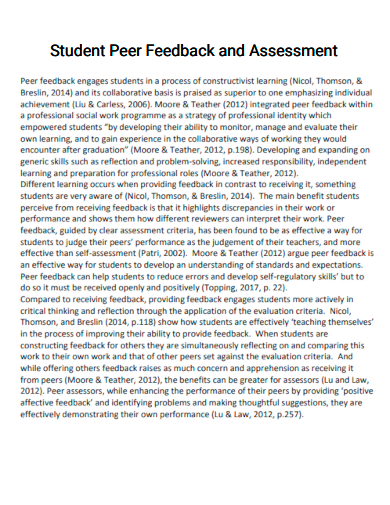
arrow.tudublin.ie
21. Anonymous Peer Feedback
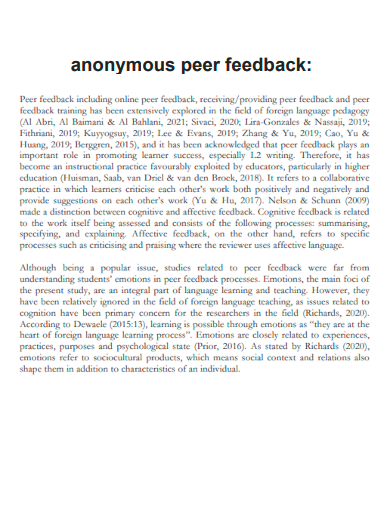
iier.org.au
22. Examining Peer Feedback
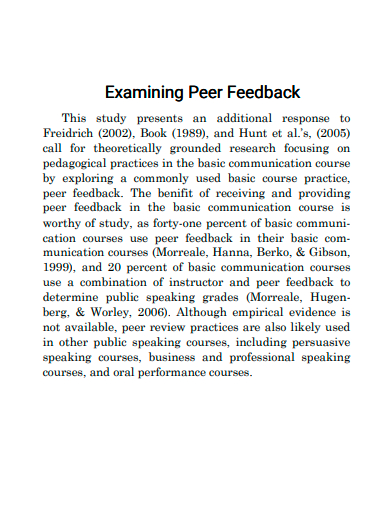
udayton.edu
23. Encouraging Peer Feedback
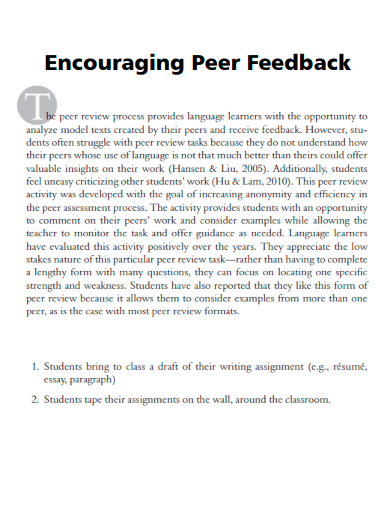
principles.org
24. Leveraging Peer Feedback
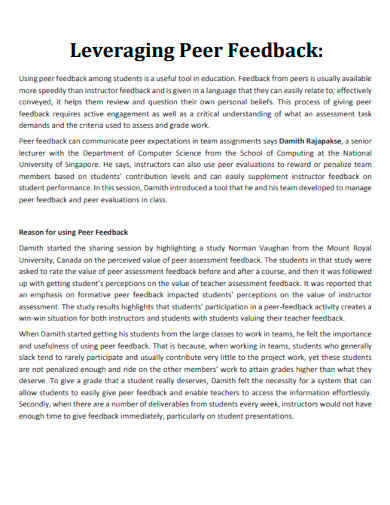
mucdn.com
25. Peer Feedback in Technology
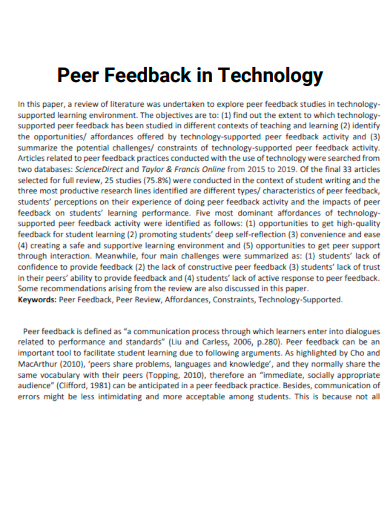
hrmars.com
26. Structure of Peer Feedback
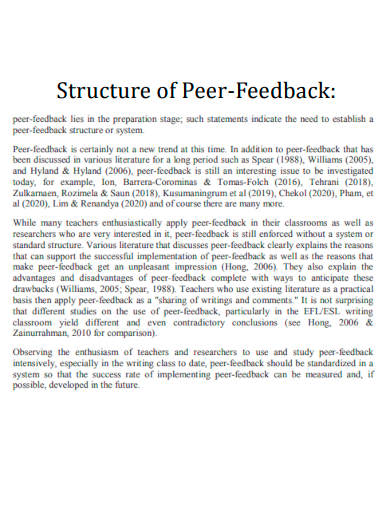
ijere.iaescore.com
What Is Peer Feedback?
Peer feedback is the act of providing a space where two or more colleagues or students of the same level can provide a feedback loop. This loop can provide an ample opportunity to create a discussion full of constructive feedback, negative feedback, and positive feedback about the concerned party’s abilities, performance, and skills in the workplace.
How to Provide Peer Feedback
For a successful peer feedback session, both parties must prepare and actively participate in the conversation while remaining open to the feedback they will receive in the session. If you want to learn more about peer feedback and its uses in school and the workplace, then you may utilize any of the peer feedback examples and samples on the links above.
Step 1: Prepare the Feedback You Want to Provide
Before planning for a peer feedback session, you must prepare the points you want to raise in your peer feedback session. You can opt to write down notes or a bulleted list on a digital or physical notepad to help pace out your thoughts and leave little to no room for miscommunication.
Step 2: Call or Conduct a Short Meeting with a Person
It is good to have a feedback session in a place that is private and comfortable. This will not only allow you and the person to have an intimate conversation, but it will also reduce the amount of external factors that can lead to issues or miscommunication.
Step 3: Share Your Feedback
When you have a feedback session with the person, it is important to determine who will provide the feedback in a specified amount of time. This will help pace out the whole session and ensure the feedback process will not be mishandled. Remember this process is a two-way street where both parties can share and obtain feedback.
Step 4: Open the Stage for a Discussion
After you have shared your feedback with the other person, you must not open the stage for a discussion about the feedback they have shared and the ways you will work on the said feedback. Note after the discussion, the other party will now provide feedback to you and will repeat this step.
FAQs
Why is it important to receive and give peer feedback?
Peer feedback allows the person to properly modulate and fix any unperceived mistakes or problems, which can improve any inefficiencies or future issues in one’s work process or attitude in school or the workplace. The same is true for the other party, where team members can properly comment and help provide feedback to each other to create a well-oiled group or team.
Can I provide negative feedback on someone’s work?
Yes, negative feedback will allow the person to know about specific issues or inefficiencies in one’s work, which the person can fix or prevent from occurring in the future. Just note, one’s delivery of negative feedback highly matters and can affect the relationship between both parties.
What is the goal of peer feedback?
The objective or goal of peer feedback is to provide a stage where people can provide and receive comments and constructive opinions about their work, work process, and attitude in a given setting or time. This will allow people to properly know any issues and prevent them from occurring in the future, thus saving time and effort.
Peer feedback is a process where two or more people of the same level will provide feedback about a specific output or process to each other. The effects of peer feedback will significantly improve the quality and efficiency of the work or studying processes of the person.

